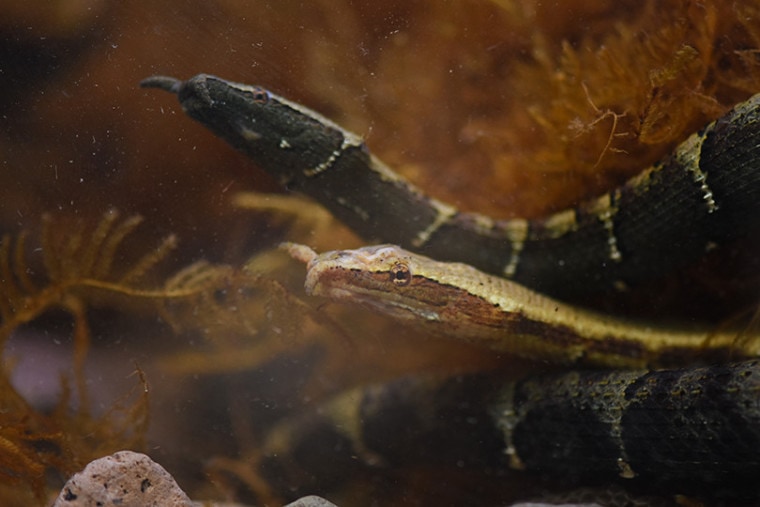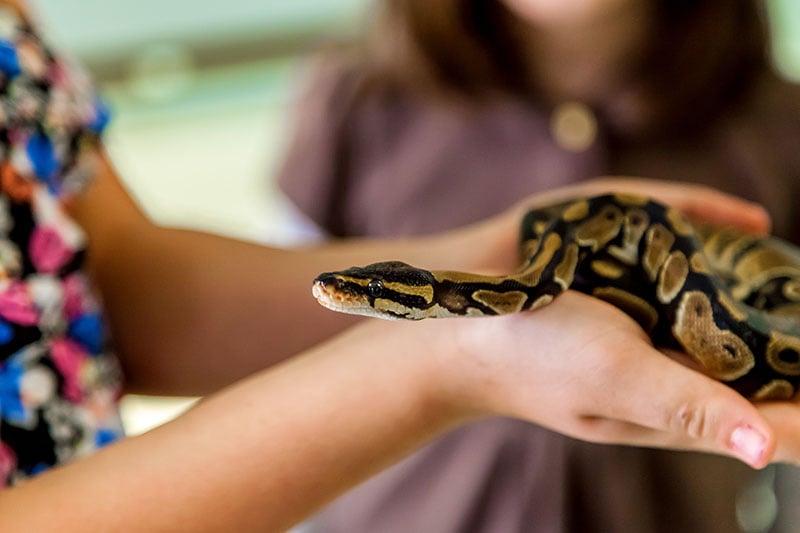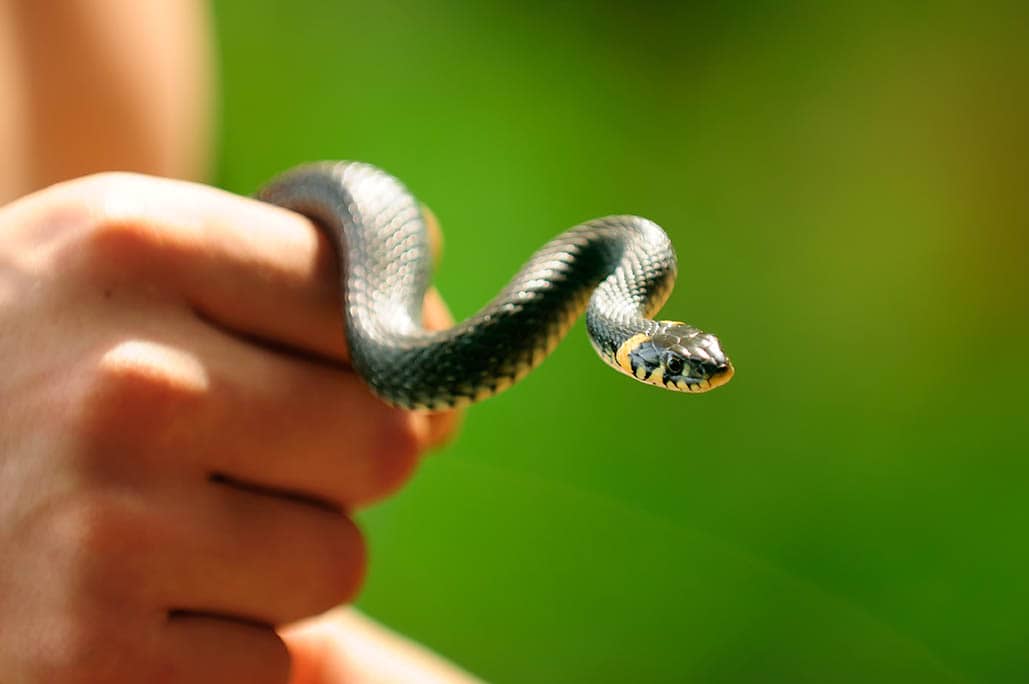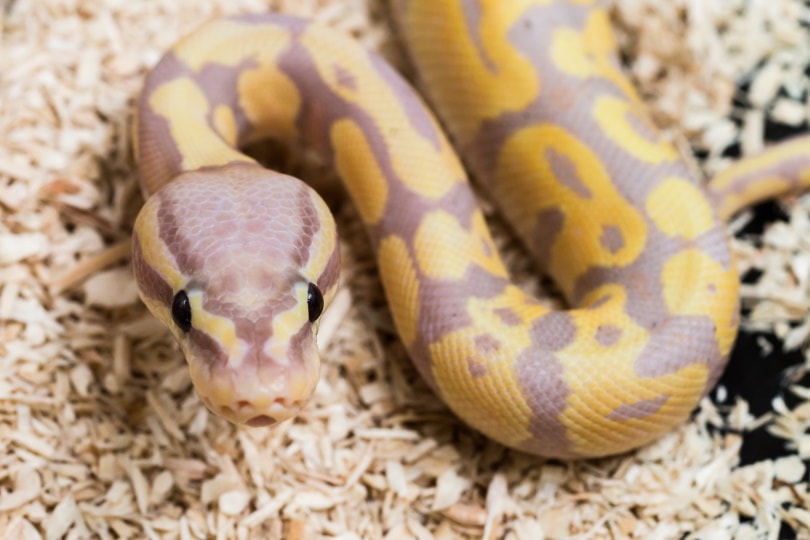
In recent years, the unusual Tentacled Snake has become more popular in the pet trade. These snakes are unusual for many reasons, including their facial tentacles and specific venom that works almost exclusively on their prey. These aquatic snakes are becoming more well known and have caught the eye of many reptile keepers. Keep reading for everything you need to know about the Tentacled Snake.
Quick Facts about Tentacled Snake
| Species Name: | E. tentaculatum |
| Common Name: | Tentacled Snake |
| Care Level: | Moderate |
| Lifespan: | 10-20 years |
| Adult Size: | 19-30 inches |
| Diet: | Piscivorous |
| Minimum Tank Size: | 20 gallons |
| Temperature: | 76-85˚F |
Do Tentacled Snake Make Good Pets?
These unique snakes can be good pets if you don’t expect too much activity out of them. They are usually most active at night, and even then, they don’t move around too much. They are docile, though, making them manageable as pets. They are unlikely to attempt to bite unless they feel threatened or mistake your hand for food.

Appearance
The Tentacled Snake got its name because of the two small tentacles on the tip of the snout. These sensory organs are used to help the snake hunt effectively. The head is long and flat. Their body can be various shades of tan, brown, or grey. They usually have splotches or stripes along the body that help them stay camouflaged in their underwater environment. They also can develop algae growth on the body, which further aids in camouflage.
How to Take Care of Tentacled Snake
Tank
A single Tentacled Snake can be kept in a 20-gallon long tank. However, many people recommend keeping them in small groups. If you are keeping multiple Tentacled Snakes, then plan for a 55-gallon tank or larger. These snakes are fully aquatic, so they need a secure, water-tight aquarium to live in. They do not require land in the environment and will simply come to the water’s surface to breathe. The lid to the tank should be tight-fitting as Tentacled Snakes are known escape artists.
Lighting
Standard day/night lighting cycles are the only requirement of lighting for the tank. If there are live plants in the tank, your light will need to be adequate to support plant life.
Heating
Although a heat lamp can be used to heat the environment, an aquarium heater is recommended. Aim to keep the temperature between 76-85˚F, and the recommended temperature range is 78-82˚F. Ensure the temperature stays stable.
Substrate and pH
No substrate is required for Tentacled Snakes as long as there are items available in the tank for them to anchor to while hunting, like driftwood. Any substrate used should be inert and natural, like sand and not painted gravel. The water’s pH should stay between 5.0-6.5, which can be achieved by keeping a blackwater environment.

Tank Recommendations
| Tank Type | 20-gallon long glass aquarium |
| Lighting | Day/night lighting |
| Heating | Aquarium heater |
| Best Substrate | Inert and natural |
Feeding Your Tentacled Snake
Tentacled Snakes are almost exclusively piscivorous, which means they eat fish. Many people feed them feeder guppies, minnows, and goldfish. Some people have success offering them raw, dead fish, but not all Tentacled Snakes are agreeable to this. In the wild, these fish are occasionally seen eating other aquatic animals, like amphibians. Many carnivorous reptile foods are acceptable for these snakes if they are agreeable to eat it. You’ll know your Tentacled Snake is ready to eat when it anchors itself in the tank and takes on the “J” position that allows them to ambush prey. Plan to feed 20-30 feeder fish per week per snake.
Diet Summary
| Fruits | 0% of diet |
| Insects | 0% of diet |
| Fish | 100% of diet |
| Supplements Required | N/A |
Keeping Your Tentacled Snake Healthy
Proper diet and water quality are necessary to maintaining the health of your Tentacled Snake. Overall, they are healthy and hardy snakes that can live a long time with no health issues with proper care.
Common Health Issues
The most common health issues seen in these snakes are related to the environment the snake lives in. A pH that is too high or subject to rapid swings can make your snake sick. They need a setup similar to what a fish or aquatic turtle would need, including proper filtration. Ammonia and nitrite levels should be maintained at 0ppm, and nitrate levels should be kept to a minimum within the tank.
Also, since these snakes are fully aquatic, if they spend too much time out of the water, they can develop external and internal injuries that can lead to death. This is why keeping the tank securely closed is important. If your Tentacled Snake escapes and is out of the water for multiple hours, it can lead to the death of the snake.
Lifespan
Not much is known about the overall lifespan of Tentacled Snakes. However, there are many reports of snakes living 9-10 years and continuing to reproduce at this age, indicating they are not “old”. Expect to have your snake for at least a decade, but it’s a good idea to plan for up to 20 years. Like most snakes, these snakes are not a short-term commitment!
Breeding
While Tentacled Snakes will often reproduce when they’re happy and healthy, they can also be challenging to breed. It took the Smithsonian over 4 years to successfully breed their Tentacled Snakes! They birth live young, so it is possible for you to be surprised by baby snakes one day. If you’re hoping to breed your snakes, then give them a safe, healthy environment with high water quality, an appropriate temperature range, and proper pH. This is your best bet to getting your snakes to breed. Because these snakes are not sexually dimorphic, determining the difference between males and females may require a veterinarian’s input.
Are Tentacled Snake Friendly? Our Handling Advice
Tentacled Snakes are considered extremely docile, but be cautious when handling them because it is possible they might confuse your hand for food. Because they are fully aquatic, it’s generally not recommended to handle them much because it can be uncomfortable and dangerous for them to be out of the water. They also can be stressed by handling and will be happiest if you look and don’t touch.
Shedding: What to Expect
Not much is known about the shedding habits of Tentacled Snakes. They do shed their skin on a regular basis, but the frequency isn’t clear. Since they grow algae on their skin and it sloughs off with the skin during a shed, they may be more susceptible to infections while the new skin grows its own algae. Make sure shed skins are removed from the water as soon as you notice them to keep them from fouling the water.
How Much Do Tentacled Snake Cost?
To purchase one of these snakes, you should expect to spend $300 or more. This is just to acquire a single snake, though. This estimate doesn’t include the cost of an enclosure with all necessary equipment. It also doesn’t account for the expense of purchasing or raising live food for your snake.
Care Guide Summary

Conclusion
These fascinating snakes are difficult to come by and tend to sell out quickly. If you’re able to commit to the care requirements of a Tentacled Snake, then you won’t be disappointed by this unusual pet. Watching the social interactions and ambush hunting behaviors of the snake can be educational. A Tentacled Snake will bring a significantly unique look to your aquarium, but don’t plan to keep it with fish!
Featured Image Credit: Tentacled snake baby,Smithsonian’s National Zoo, Flickr, Attribution CC 2.0







